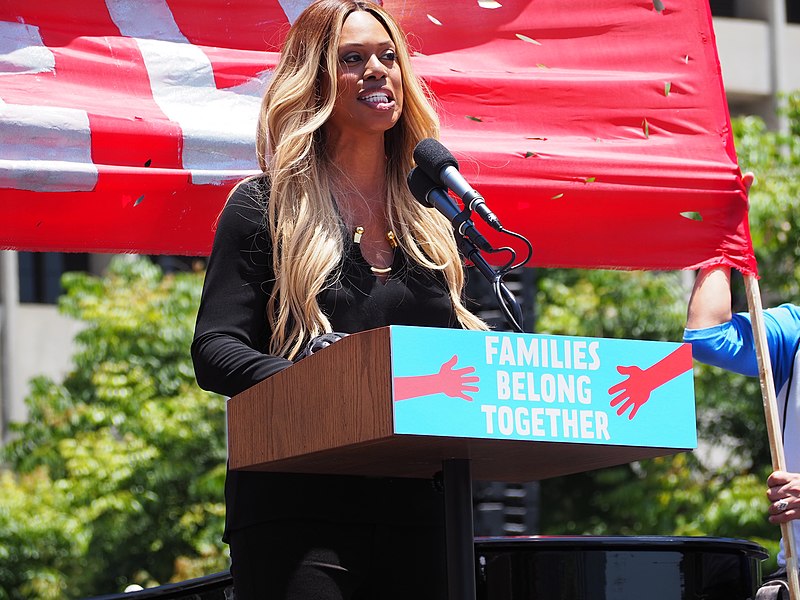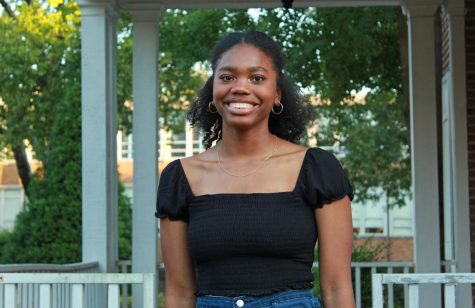Mays: Are pretty people better than us?
Luke Harold [Public domain], via Wikimedia Commons
Actress and transgender activist Laverne Cox speaks at an event.
September 26, 2019
Have you ever been offered a discount because of something other than a coupon? Have you ever gotten into an event despite not having a ticket? If so, then have you ever considered the fact that you might have pretty privilege? In our society, we claim to treat people based on their personality, “the person behind their looks,” but we all know that’s not always true.
When we meet someone, the first thing we are met with is their appearance. The media likes straight white teeth and clear glass skin. The popular girls in the movies are always skinny and blonde while the boys are muscular and 6’2”. The world has put ideas of what pretty is in our minds, and no matter how much we create our own idea of what beautiful is, pretty privilege will remain limited to the stereotypical picture of what the world thinks is beautiful. It’s hard not to judge someone by their looks until you form a relationship with them. Because of these logistics of human nature, pretty privilege exists.
Some may claim that pretty privilege is not real, but the economy itself shows how important being considered pretty is to some people. South Korea has the highest rate of cosmetic surgery per capita. According to National Public Radio (NPR), one in three women between the ages of 19 and 29 have had plastic surgery. This is not to say all plastic and cosmetic surgeries are for the purpose of reaching a beauty standard, but a large majority of them are. Heather Willoughby, a professor of women’s and cultural studies at Seoul’s Elwha Woman’s University says, “There’s just a sense that to conform, to be part of that norm, you have to look a certain way, act a certain way.” In places like South Korea, a large portion of the population feels the need to be the prettiest. This often leads people to believe that being pretty is the key to being happy and having a successful life because who wants an ‘ugly’ friend, lover or employee?
Studies show that even babies like looking at attractive faces as opposed to others. “On average, the babies spent 80 percent of the time looking at the attractive face in the pair[of their mother’s].” If our own babies prefer pretty people, then it only makes sense that the grown-ups in the real world like them better as well.
A big problem with pretty privilege is that your looks may end up determining your future. Time magazine quotes Rachel Gordon, a sociology professor at the University of Illinois in Chicago, saying, “The kids who were better-looking reported higher levels of teacher attention, more friends and less depression.” Being judged by your looks doesn’t begin here. It goes back to elementary school. In another study, teachers were given folders with objective information on elementary children and their pictures. The teachers believed the attractive children were more likely to succeed and have higher expectations for their future.
Companies will also say that things like ‘straight teeth will improve your overall opportunities and chances of getting a job.’ The Kelton Research says, “…all other things being equal, job candidates with straight teeth are seen as 45 percent more likely to get hired than those with crooked teeth.” Imagine applying for your dream job only for it to be taken by someone because their teeth are straight and yours aren’t. Your teeth shouldn’t be a deciding factor on whether you will get a job or not.
In an interview with Allure, Laverne Cox, a transgender woman, spoke about her transition and mentions some ideas of pretty privilege. “Suddenly, I was let in, and I did nothing to earn the attention my prettiness granted me,” Cox said. “I soon saw that people stared and smiled, offered me seats on the bus and drinks in the club, complimented me on my appearance, and held doors open.” Cox is a prime example of how pretty privilege can change your day to day life. She knows what it’s like to experience both ends of the spectrum, going from being an average person to having pretty privilege.
Pretty privilege exists. What are the people who have it supposed to do?
I’m not telling you to turn down the seat you’ve been offered at the next social event you go to, but acknowledge the privilege you own. Pretty privilege makes life easier. It isn’t something that’s as impactful as racial or religious privilege, but it’s something that puts a divide between a group of people. Once you are able to acknowledge your privilege, it allows the topic to be put on a platform to be discussed. People can learn to not take advantage of their privilege and misuse it as a get out of jail free card for whenever it’s convenient for them. We can change the ways of the world and provide equal benefits for people of all standards of beauty.










